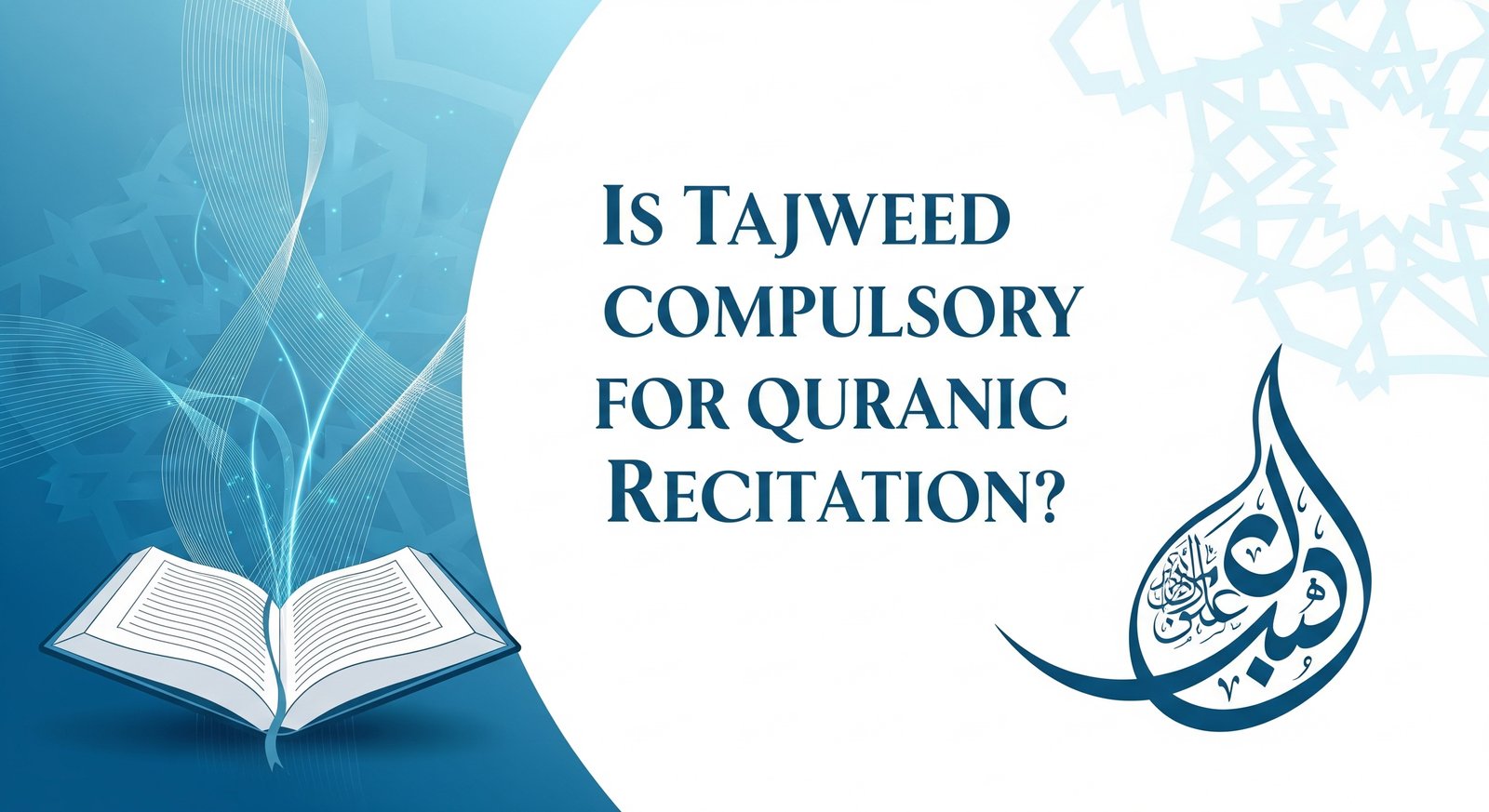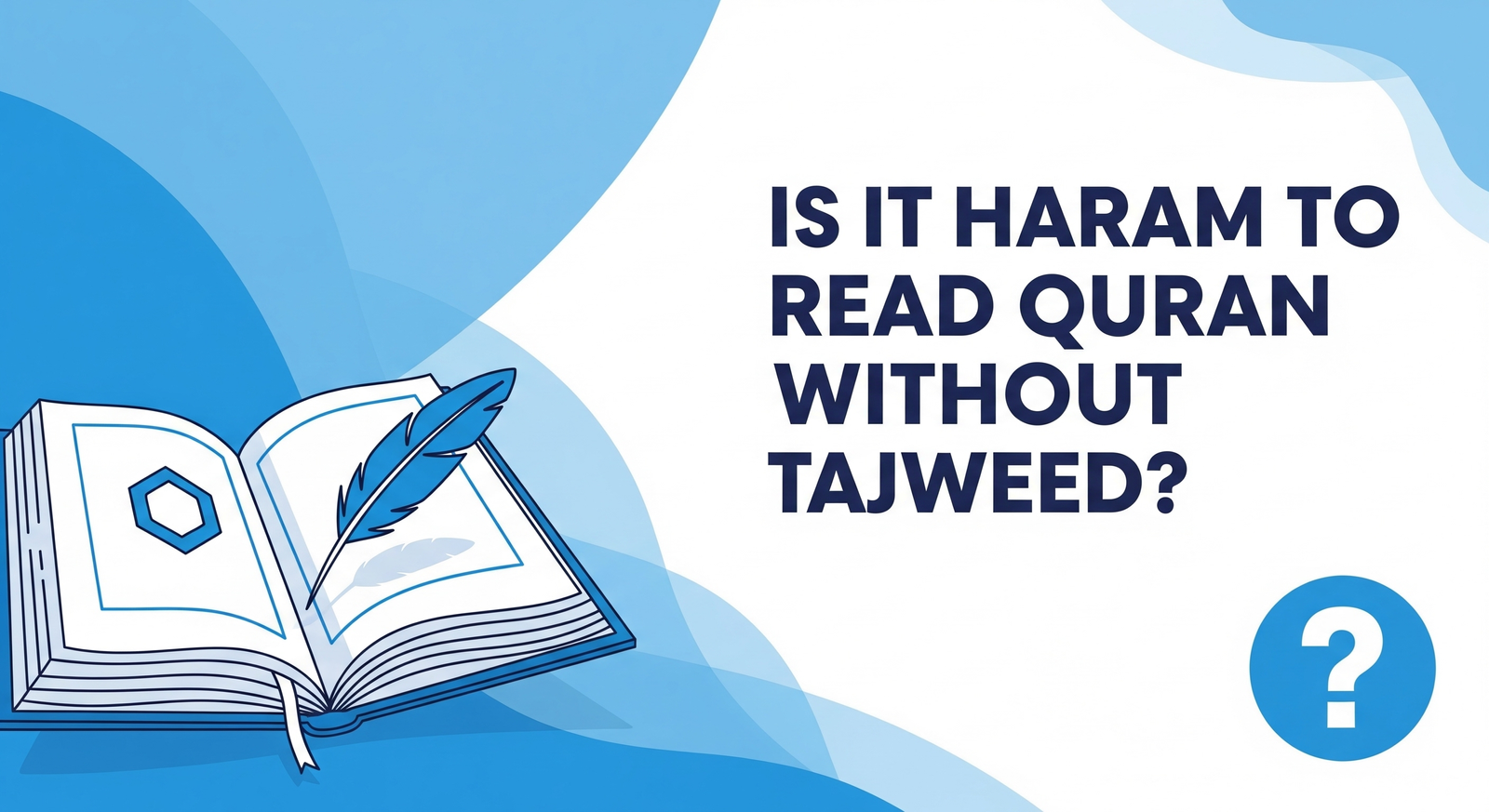Starting With The Name Of Almighty Allah
The Quran is the divine word of Allah, a sacred guide for Muslims worldwide, revered for its spiritual depth and linguistic beauty. For many, reciting the Quran is a cherished act of worship, but a common question arises: Is it compulsory to recite Quran with Tajweed? This question often sparks curiosity, especially among new learners or those seeking to deepen their connection with the holy text. Alongside queries like Is it haram to read Quran without Tajweed?, Muslims want clarity on whether mastering Tajweed—the art of reciting the Quran with precise pronunciation and melody—is a religious obligation or a recommended practice.
In this comprehensive guide, we’ll explore the religious, spiritual, and practical dimensions of reciting the Quran with Tajweed. Drawing from Quranic verses, authentic Ahadees, and scholarly insights, we’ll address whether Tajweed is mandatory, its significance in preserving the Quran’s integrity, and how it enhances the recitation experience.
What Is Tajweed and Why Does It Matter?
Tajweed, derived from the Arabic word “jawwada,” meaning “to make better” or “to perfect,” is the science of reciting the Quran with accurate pronunciation, articulation, and rhythm, as it was revealed to Prophet Muhammad (peace be upon him). It encompasses rules governing the correct pronunciation of Arabic letters (Makharij), their attributes (Sifaat), and other principles like elongation (Madd) and pausing (Waqf). Tajweed ensures that every word is recited with precision, preserving the Quran’s divine message and enhancing its melodious beauty.
The Quran itself emphasizes the importance of measured recitation:
“And recite the Quran with measured recitation.”
(Surah Al-Muzzammil, 73:4)
This verse underscores the value of reciting the Quran deliberately and correctly, which is the essence of Tajweed. By adhering to these rules, reciters honor the sanctity of Allah’s words, ensuring no distortion in meaning or pronunciation. To dive deeper into the fundamentals, explore “What is Tajweed in Quran? Tajweed Principles & Importance” for a detailed understanding of Tajweed’s core concepts.
Why Tajweed Matters in Quranic Recitation

Tajweed is not just about beautifying recitation; it serves critical purposes:
- Preserving Meaning:
Arabic is a precise language where slight mispronunciations can alter meanings. For example, mispronouncing “قلب” (heart) as “كلب” (dog) due to incorrect articulation of ق (qaf) changes the word entirely. Tajweed safeguards the Quran’s intended message.
- Following the Sunnah:
The Prophet (peace be upon him) recited the Quran with Tajweed, as taught by Angel Jibreel. Emulating his recitation is a way to align with his practice.
- Spiritual Connection:
Tajweed enhances the emotional and spiritual impact of recitation, fostering tranquility, as Allah says:
“Verily, in the remembrance of Allah do hearts find rest.”
(Surah Ar-Ra’d, 13:28)
For those eager to understand Tajweed’s broader role, “The Importance of Tajweed and Its Purpose in Quran Reading” offers valuable insights into its significance.
Is Tajweed Compulsory for Quranic Recitation?

The question of whether Tajweed is compulsory hinges on Islamic scholarship and the context of recitation. Let’s break it down:
Scholarly Perspectives on Tajweed’s Obligation
Islamic scholars have varying opinions, but a consensus emerges based on the level of Tajweed proficiency:
Basic Tajweed (Correct Pronunciation):
Scholars unanimously agree that reciting the Quran with correct pronunciation is obligatory to avoid altering its meaning. Errors that change the meaning of words (known as Lahn Jali or clear mistakes) are considered sinful if done intentionally or due to negligence. For example, Imam Ibn al-Jazari, a renowned scholar of Qira’at, stated:
“And applying Tajweed is an issue of absolute necessity, whoever doesn’t apply Tajweed to the Qur’an, then a sinner is he.”
(Al-Jazariyyah)
This refers to ensuring the basic articulation (Makharij) and attributes (Sifaat) of letters are correct, which is essential for all Muslims reciting the Quran, especially in Salah (prayer).
Advanced Tajweed (Melodic Rules):
Advanced Tajweed rules, such as elongation (Madd), nasalization (Ghunnah), or specific pausing (Waqf), are considered recommended (mustahabb) rather than compulsory for the average reciter. These enhance the beauty and rhythm but are not mandatory unless one is leading prayers or teaching others.
Is It Haram to Read Quran Without Tajweed?

A common concern is: Is it haram to read Quran without Tajweed? The answer depends on the nature of the recitation:
If Errors Alter Meaning:
Reading without basic Tajweed, leading to significant mistakes that change the Quran’s meaning, is impermissible (haram) if the reciter is capable of learning but neglects to do so. For instance, confusing letters like ع (‘ayn) and ء (hamza) could distort the text’s message, which is a serious matter.
If Errors Are Minor:
For beginners or those with limited access to learning, minor mistakes (Lahn Khafi or hidden errors) that don’t alter meaning are not sinful, as effort is rewarded. The Prophet (peace be upon him) said:
“The one who is proficient in the recitation of the Quran will be with the honorable and obedient scribes (angels), and he who recites the Quran and finds it difficult to recite, doing his best to recite it in the best way possible, will have a double reward.”
(Sahih Muslim, Hadith 798)
This Hadith reassures learners that sincere effort, even with challenges, is highly rewarded. Thus, while basic Tajweed is essential, reading without perfect Tajweed is not inherently haram if the reciter strives to improve.
Tajweed in Salah: A Special Consideration
In Salah, where Quranic recitation is a pillar of the prayer, correct pronunciation is crucial to ensure the prayer’s validity. Mispronunciations that alter meaning can invalidate Salah. For example, reciting “Al-Hamdu” instead of “Al-Hamd” in Surah Al-Fatiha could change the meaning, affecting the prayer. Therefore, learning at least the basic Tajweed rules is vital for every Muslim to fulfill their religious obligations. To master these skills, consider enrolling in an online Tajweed course with expert instructors who guide you step-by-step. Since Quranic recitation directly affects the validity of prayer, the question discussed in Is Tajweed Mandatory in Salah? – Najam Academy becomes especially important for anyone leading or regularly performing Salah.
The Spiritual and Practical Benefits of Tajweed
Even if advanced Tajweed is not mandatory, its benefits make it a highly recommended practice. Here are key advantages:
Spiritual Enrichment
Reciting with Tajweed transforms recitation into a meditative act, deepening one’s connection with Allah. The rhythmic and melodious flow of Tajweed enhances the emotional impact, as the Quran states:
“And We send down of the Quran that which is healing and mercy for the believers.”
(Surah Al-Isra, 17:82)
Tajweed elevates this healing experience, fostering inner peace and spiritual growth.
Preservation of the Quran
Tajweed ensures the Quran is recited as it was revealed, preserving its linguistic and spiritual authenticity. Allah promises:
“Indeed, it is We who sent down the Quran and indeed, We will be its guardian.”
(Surah Al-Hijr, 15:9)
By adhering to Tajweed, reciters contribute to this divine preservation, maintaining the Quran’s purity across generations.
Enhanced Understanding
Correct pronunciation aids in comprehending the Quran’s meanings, unlocking its wisdom. Tajweed helps reciters appreciate the linguistic miracle of the Quran, as Allah says:
“Indeed, We have sent it down as an Arabic Quran that you might understand.”
(Surah Yusuf, 12:2)
Community Inspiration
A beautiful recitation inspires others to engage with the Quran. The Prophet (peace be upon him) said:
“Beautify the Quran with your voices, for a beautiful voice increases the beauty of the Quran.”
(Sunan an-Nasa’i, Hadith 1015)
Tajweed-trained reciters can lead prayers or teach others, fulfilling the Sunnah:
“The best among you are those who learn the Quran and teach it.”
(Sahih al-Bukhari, Hadith 5027)
For a deeper exploration of these advantages, read “Benefits of Reading Quran with Tajweed” to understand how Tajweed enriches your recitation experience.
Common Misconceptions About Tajweed
Several misconceptions surround Tajweed, which can deter learners. Let’s address them:
Tajweed Is Only for Advanced Reciters:
Tajweed is for everyone, from beginners to experts. Basic rules are accessible and essential for all Muslims.
Tajweed Is Too Difficult:
While Tajweed requires effort, structured learning and consistent practice make it achievable. Platforms like Najam Academy offer Tajweed lessons online tailored to all levels.
Reading Without Tajweed Is Always Wrong:
Minor errors by beginners are not sinful if they strive to improve. The focus is on effort and progress.
How to Learn Tajweed Effectively
Learning Tajweed is a rewarding journey that anyone can undertake. Here are practical steps to get started:
1. Start with the Basics
Begin with the Arabic alphabet and Makharij (articulation points). Understanding where each letter originates in the mouth or throat is foundational. For guidance, check out ‘What Is Makhraj In Tajweed? Makharij Of Arabic Letters (Articulation)‘. Before beginning formal Tajweed practice, learners should clearly understand the distinction explained in What is Tajweed and Makhraj? Difference Between Makhraj And Tajweed, as confusing the two often leads to foundational mistakes.
2. Enroll in Structured Courses
Joining a reputable program ensures systematic learning. Learn Quran Online with Tajweed at Najam Academy provides expert-led courses with personalized feedback, making it ideal for beginners and advanced learners alike.
3. Practice Daily
Consistency is key. Dedicate time daily to recite short Surahs like Al-Fatiha, applying Tajweed rules. The Prophet (peace be upon him) said:
“The deeds most beloved to Allah are those done consistently, even if they are small.”
(Sahih al-Bukhari, Hadith 6464)
4. Listen and Imitate
Listen to renowned Qaris like Sheikh Mishary Rashid Alafasy or Sheikh Abdul Basit. Imitating their style helps internalize Tajweed rules.
5. Seek Feedback
Record your recitation and share it with knowledgeable teachers or peers for correction. Online platforms facilitate this through interactive sessions.
For a comprehensive guide on self-learning, explore How to Learn Quran with Tajweed at Home? for practical tips tailored to home-based learners.
Challenges in Learning Tajweed and How to Overcome Them
Learning Tajweed can present challenges, especially for non-Arabic speakers:
Pronunciation Difficulties:
Letters like ع (‘ayn) or ق (qaf) can be tough. Practice with audio aids and mirror exercises to perfect articulation.
Time Constraints:
Busy schedules can hinder progress. Schedule short, daily sessions, such as after Fajr, to stay consistent.
Lack of Guidance:
Self-learning may lead to unnoticed errors. Enroll in structured courses for expert feedback.
Motivation Wanes:
Set small, achievable goals and remind yourself of the spiritual rewards to stay motivated.
Tajweed for Children and Beginners
Introducing Tajweed to children or beginners requires a gentle approach:
● Make It Fun: Use games, colorful charts, and rewards to engage young learners.
● Start Simple: Focus on basic Makharij and short Surahs to build confidence.
● Lead by Example: Recite with Tajweed in front of children to inspire them.
Parents can leverage online resources to make learning interactive. A family-oriented Hadith to inspire:
“The best among you are those who learn the Quran and teach it.”
(Sahih al-Bukhari, Hadith 5027)
Learners struggling with pronunciation can benefit from practical techniques shared in How to Read the Quran with Makhraj? Learn Quran with Makharij, which focuses specifically on applying articulation rules during recitation.
Conclusion: Embracing Tajweed as an Act of Worship
While basic Tajweed is essential to avoid altering the Quran’s meaning, advanced Tajweed is a recommended practice that enhances recitation’s beauty and spiritual impact. The question Is it compulsory to recite Quran with Tajweed? finds balance: correct pronunciation is a duty, but perfecting melodic rules is a virtuous pursuit. Similarly, Is it haram to read Quran without Tajweed? depends on intent and effort—sincere learners are rewarded, not punished, for their struggles.
By embracing Tajweed, you honor the Quran, follow the Sunnah, and deepen your spiritual connection. Start your journey today with small, consistent steps, and let the Quran’s divine words resonate in your heart. Najam Academy’s expert-led courses make learning Quran with Tajweed accessible to all, turning every recitation into a profound act of worship. May Allah bless your efforts and make your recitation a source of light and guidance.
“Indeed, this Quran guides to that which is most suitable and gives good tidings to the believers who do righteous deeds that they will have a great reward.”
(Surah Al-Isra, 17:9)




